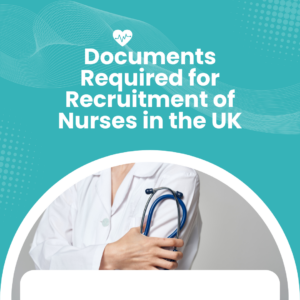In-Demand Specialties: The Most Sought-After Nursing Roles in the UK
Are you considering a career in nursing in the UK? The world of healthcare is dynamic and ever-evolving, and the demand for skilled nurses continues to grow. Whether you’re a nursing student exploring potential paths or an experienced nurse looking to specialize, understanding the in-demand nursing specialties can help you make informed decisions about your career journey. In this article, we’ll delve into the most sought-after specialties nursing roles UK and provide insights into what makes each specialty unique and rewarding. Nursing is a noble profession that plays an important role in the healthcare structure. As medical advancements and patient needs evolve, certain nursing specialties become particularly sought-after due to their unique contributions to patient care. In the UK, several nursing specialties are in high demand, offering nurses opportunities to make a significant impact on patient outcomes and well-being. The job market for nursing graduates in the UK is competitive, but there are many rewarding positions available.
The Growing Need for Specialized Nursing
In today’s complex healthcare landscape, specialized nursing is crucial for delivering tailored and effective care. General nursing skills are essential, but specialized knowledge allows nurses to address specific patient needs with precision and expertise. This article explores some of the most in-demand nursing specialties in the UK, shedding light on their significance and the qualities that make them rewarding career choices.
Critical Care Nursing: Saving Lives on the Frontline
Critical care nursing is a high-stakes specialty that involves caring for critically ill patients in intensive care units (ICUs). Critical care nurses are skilled in monitoring patients’ vital signs, administering medications, and providing life-saving interventions. They play a pivotal role in collaborating with interdisciplinary teams to stabilize and improve patients’ conditions. The transition from student to professional is an exciting journey for nursing graduates in the UK, as they enter the workforce.
Mental Health Nursing: The Gap in Psychological Care
Mental health nursing addresses the intersection of physical and mental well-being. Mental health nurses work with individuals facing psychiatric disorders, offering therapeutic support, medication administration, and creating safe environments. Their compassionate care contributes to patients’ recovery and reintegration into society.
Pediatric Nursing: Nurturing the Future Generation
Pediatric nursing focuses on infants, children, and adolescents, providing specialized care tailored to young patients’ unique needs. Pediatric nurses monitor growth and development, administer vaccinations, and offer family-centered care that helps ease children’s anxieties during hospital stays.
Geriatric Nursing: Caring for the Elderly Population
Geriatric nursing involves caring for the aging population, addressing their specific health challenges and promoting quality of life. Geriatric nurses work in various settings, including nursing homes and home care, ensuring elderly patients receive dignified and comprehensive care.
Surgical Nursing: Precision and Compassion in the Operating Room
Surgical nursing is fast-paced and demanding, requiring nurses to collaborate closely with surgeons during procedures. These nurses ensure sterile environments, assist in surgeries, and provide post-operative care to promote patients’ recovery.
Obstetric and Gynecological Nursing: Guiding Women Through Life’s Milestones
Obstetric and gynecological nursing revolves around women’s reproductive health, including pregnancy, childbirth, and postpartum care. These nurses provide education, emotional support, and medical care throughout women’s various life stages.
Community Health Nursing: Promoting Wellness Beyond the Hospital
Community health nursing focuses on preventive care and health education within communities. Nurses in this specialty work to improve public health outcomes by conducting health assessments, organizing wellness programs, and advocating for healthy behaviors.
Palliative Care Nursing: Bringing Comfort and Dignity in End-of-Life Care
Palliative care nursing is dedicated to enhancing the quality of life for patients with serious illnesses. These nurses manage pain, provide emotional support, and ensure patients’ comfort and dignity during their final moments.
Oncology Nursing: Supporting Patients on Their Cancer Journey
Oncology nursing involves caring for cancer patients, supporting them through diagnosis, treatment, and recovery. Oncology nurses offer both medical care and emotional support, helping patients and their families navigate the challenges of cancer treatment.
Diabetes Nursing: Managing and Educating for Better Health
Diabetes nursing focuses on helping patients manage diabetes and prevent complications. These nurses educate patients about glucose monitoring, medication administration, and lifestyle changes that contribute to better diabetes management.
Neonatal Nursing: Specialized Care for the Tiniest Patients
Neonatal nursing centers on the care of newborn infants, particularly those born prematurely or with medical conditions. Neonatal nurses provide specialized medical attention, monitor neonatal development, and offer support to families.
Cardiac Nursing: Heart-Centered Care for Cardiac Patients
Cardiac nursing specializes in caring for patients with heart conditions. These nurses monitor cardiac health, administer medications, and educate patients on heart-healthy lifestyles to prevent future issues.
Conclusion
In the ever-evolving field of nursing, specialized roles play a vital role in delivering targeted care to diverse patient populations. From critical care to mental health, pediatric to geriatric care, each nursing specialty brings its own unique challenges and rewards. As you embark on your nursing journey, consider the areas that resonate with you most, and explore the opportunities to make a meaningful impact on the lives of patients. With a strong foundation of education, nursing graduates are well-equipped to excel in their careers in the UK.









